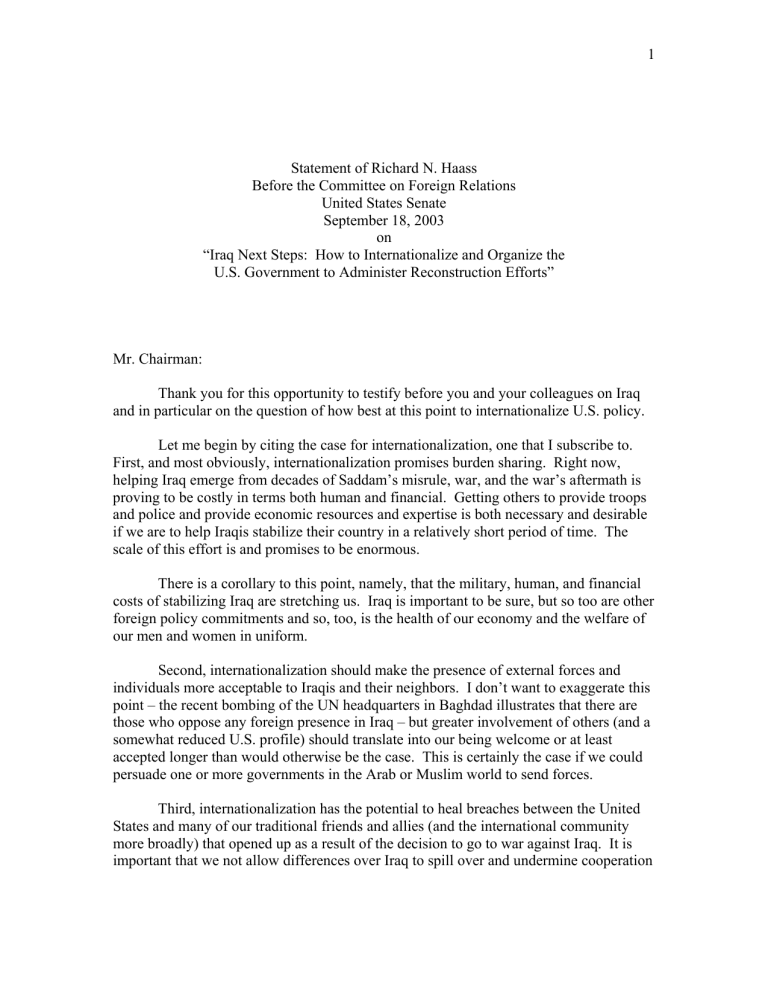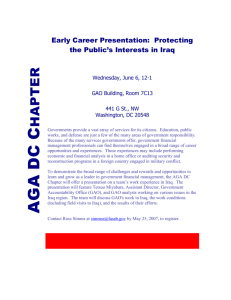1 Statement of Richard N. Haass Before the Committee on Foreign Relations

1
Statement of Richard N. Haass
Before the Committee on Foreign Relations
United States Senate
September 18, 2003 on
“Iraq Next Steps: How to Internationalize and Organize the
U.S. Government to Administer Reconstruction Efforts”
Mr. Chairman:
Thank you for this opportunity to testify before you and your colleagues on Iraq and in particular on the question of how best at this point to internationalize U.S. policy.
Let me begin by citing the case for internationalization, one that I subscribe to.
First, and most obviously, internationalization promises burden sharing. Right now, helping Iraq emerge from decades of Saddam’s misrule, war, and the war’s aftermath is proving to be costly in terms both human and financial. Getting others to provide troops and police and provide economic resources and expertise is both necessary and desirable if we are to help Iraqis stabilize their country in a relatively short period of time. The scale of this effort is and promises to be enormous.
There is a corollary to this point, namely, that the military, human, and financial costs of stabilizing Iraq are stretching us. Iraq is important to be sure, but so too are other foreign policy commitments and so, too, is the health of our economy and the welfare of our men and women in uniform.
Second, internationalization should make the presence of external forces and individuals more acceptable to Iraqis and their neighbors. I don’t want to exaggerate this point – the recent bombing of the UN headquarters in Baghdad illustrates that there are those who oppose any foreign presence in Iraq – but greater involvement of others (and a somewhat reduced U.S. profile) should translate into our being welcome or at least accepted longer than would otherwise be the case. This is certainly the case if we could persuade one or more governments in the Arab or Muslim world to send forces.
Third, internationalization has the potential to heal breaches between the United
States and many of our traditional friends and allies (and the international community more broadly) that opened up as a result of the decision to go to war against Iraq. It is important that we not allow differences over Iraq to spill over and undermine cooperation
2 elsewhere, be it elsewhere in the greater Middle East, in Afghanistan, or the war on terrorism.
The above notwithstanding, I also feel compelled at this point in my statement to note the limits to internationalization and what it can achieve. The moment is gone (if it ever existed) where it is realistic to expect substantial additional international military involvement. My sense is that the mission is widely perceived in most countries as being too dangerous and the politics at home too controversial for governments to dispatch large numbers of forces if they in fact have such forces at their disposal. This is unfortunate, as everyone shares an interest in Iraq’s future success, but it is nonetheless the reality we must deal with.
If this judgment is correct, it highlights the need to emphasize the “Iraqi-ization” of the security situation as quickly as can be accomplished. This makes sense on multiple levels, as Iraqis in uniform are most acceptable to their fellow countrymen, they speak the language and know the neighborhoods, they need the jobs. My principal concern in this regard is that experience elsewhere suggests that fielding and training local police and military units will take more time and resources than is often anticipated.
I also believe there is a danger in too much internationalization in the security sphere. We want a UN authorized force, but not a UN force per se. The United States should retain command of forces in Iraq given the demanding security challenge. Doing this under a UN umbrella (as called for in the new UN Security Council resolution being circulated in New York) makes the most sense.
I would only add two additional points in this regard. First, we should not ask neighboring states to participate inside Iraq in the security sphere. There is too much potential for mischief—or the perception of mischief that could lead to real problems.
Second, we should avoid setting any exit dates for such a force. It is impossible to know in advance how long the mission will take to be completed. Setting artificial deadlines only raises expectations and creates problems down the line if and when expectations and reality do not coincide.
Internationalization of the economic dimension of rebuilding Iraq is also desirable and necessary. The scale of the effort is large by any measure—Iraq is quickly becoming the mother of all reconstructions -- and what Iraqis can be expected to fund themselves is likely to be quite limited for a number of years. The upcoming meeting in Madrid will be important. Unfortunately, both the controversy surrounding the Iraq war and what might be described as “donor fatigue” is likely to lead to a result in that what is pledged and delivered falls considerably short of what is sought.
But whatever chance there exists of getting substantial economic help lies in first reaching political consensus. Passage of a new UN Security Council resolution is a prerequisite. To put it bluntly, governments and organizations will not pay if they are not allowed to play – and by “play” I mean participate meaningfully in the overall management of the Iraq project.
3
The obvious difficulty arises in determining the details, i.e., How much should the writ of the Coalition Provisional Authority (CPA) be diluted? In principle, dilution or power sharing needs to be done vis-à-vis both the international community and with
Iraqis. As regards the former, the United States should resist calls to replace the CPA and its leadership with a UN or other international administrator. Observers can and will argue whether this should have been done from the outset, but given where things now stand, too much time would be lost while a new individual and organization got up to speed; necessary Iraqi-ization would only be delayed. In addition, the United States arguably has invested too much and has too much at stake for this to be acceptable. But this does not mean we can or should continue as we have. Setting up some contact or coordinating group in Baghdad, one consisting of key contributors, would help. At the end of the day, the quality of the relationships and consultations will matter more than the formal structure or arrangements.
Greater Iraqi self-governance is desirable, but here, too, we should avoid specific timetables (the political equivalent of exit dates) and simply commit to transferring authority to Iraqis as quickly as can be responsibly and reasonably carried out. It is not unrealistic to aim for significant self-government by next summer, although experience in
Afghanistan and elsewhere suggests that carrying out constitutional development and elections will take longer than hoped for. We should also not be averse to introducing meaningful amounts of self-rule at the local level before we attempt it nationally. But trying to give Iraqis full control of their country prematurely does them and us no favors.
Mr. Chairman, I would like to close with one last thought. Nearly everything about the Iraq war has been controversial, and it has strained U.S. relationships with many of the world’s governments and peoples. Regardless of one’s view on the wisdom of the war, we should make a concerted effort to forge a common approach in Iraq given the stake that we all have in its success. But we should also devote time and energy to consultations about how we can all best deal with future Iraqs, that is, other cases where governments with a history of aggression against their own people or their neighbors develop weapons of mass destruction or support terrorism. We also need to be better prepared for assisting societies as they emerge from conflicts. As a result, greater consensus is needed for when force can legitimately be used and greater capacity is needed for coping with the after effects. In short, some “preventive internationalization” is called for if we are to be better able to cope with challenges characteristic of this era.
Thank you. I look forward to your questions.
Note: Richard N. Haass is President of the Council on Foreign Relations. This statement represents his personal views. The Council takes no institutional position on policy issues.





